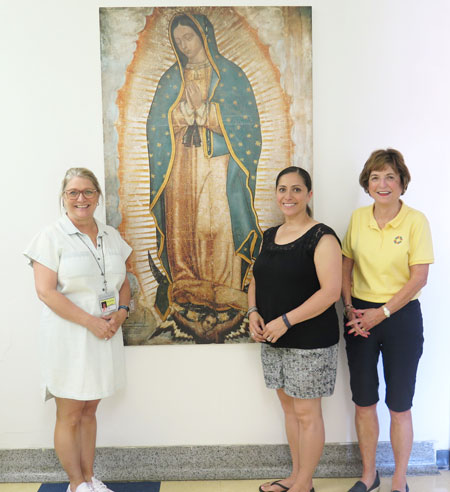Anne Marie Amacher
The Catholic Messenger
DAVENPORT — Administrators from two Catholic schools returned from the Latino Enrollment Institute at the University of Notre Dame excited to embrace what they learned and energized to engage others in that education.

From left, Julie Delaney, Octavia Houtekier-Boyd and Jeanne Von Feldt stand with an image of Our Lady of Guadalupe at St. Paul the Apostle Catholic School in Davenport. The administrators returned from the Latino Enrollment Institute at the University of Notre Dame last week.
Principal Julie Delaney and Assistant Principal Octavia Houtekier-Boyd of St. Paul the Apostle Catholic School and Principal Jeanne Von Feldt of All Saints Catholic School attended the three-day conference June 28-30.
Returning home, they promptly met with Scott County Catholic school administrators and The Catholic Messenger to share their experiences.
The Latino Enrollment Institute (LEI) developed in response to national data suggesting Latinos are both the fastest-growing segment of the U.S. Catholic Church and the most underserved by Catholic schools, its website states. The University of Notre Dame’s Catholic School Advantage program founded the LEI in 2012. The institute identifies and assists Catholic schools with “substantial unmet capacity (open seats), favorable demographic potential — namely, a growing number of Latino families in the surrounding area — and motivated principals by offering a framework to transform schools in order to attract and serve Latino families.”
Von Feldt said Manuel Fernandez, the program director, contacted her in 2012 after reading Catholic Messenger articles online about All Saints’ diversity. “This is a strong, faith-filled group that believes in the Latino enrollment growth in schools and the Catholic Church,” Von Feldt said of the institute. In 2013, she attended her first institute and for the past five years has served as a mentor for other Catholic schools outside the diocese.
Houtekier-Boyd, a graduate of the Remick Leadership Program at Notre Dame, learned more about the Latino program through that connection and approached Delaney about it. They applied but the pandemic caused cancellation of last year’s program. They attended together this year.
Von Feldt said she learns something new each time she attends. She does not mentor St. Paul the Apostle, whose mentor is from Columbus, Georgia. Each school meets with its team and mentor monthly online. Von Felt said in the beginning she had to visit each school she mentored in person, which offered advantages, but also was time consuming and expensive.
All three diocesan participants at this year’s institute appreciated the variety of talks offered on topics such as Spanish 101, English as a Second Language (ESL), pastor-principal relationships, marketing and strengthening and sustaining Catholic schools.
Houtekier-Boyd said the instructors stressed that even if someone does not know Spanish, just learning a few key phrases and offering a smile are welcoming signs to families. “Our mission is to welcome and have them become part of our school and parish community.” Von Felt said she adapts some of the knowledge she gains to the Vietnamese community at All Saints. Catholic schools in the United States were formed for immigrants “and we need to carry on that mission,” Delaney said. “We need to be here for them.” She said institute participants told their stories and “have a passion for Catholic education.”
Houtekier-Boyd stressed that faith is very important to the Latino community and they get very involved in parishes and schools. Delaney met with St. Paul the Apostle Parish staff after the institute, who expressed enthusiasm about what she shared. She learned the number of Latino families in the parish is much larger than she thought.
Latinos believe Catholic schools are not affordable because in Mexico “it is for the elite,” Delaney said. That misconception needs to be corrected. “Catholic schools are open to everyone, not just the rich,” she added. With various scholarships, School Tuition Organization funds and other financial aid programs, a Catholic education can be affordable.
The institute participants will engage in a retreat in January for an update on progress in planning and implementation, Von Feldt said. “We will be reenergized again.”











